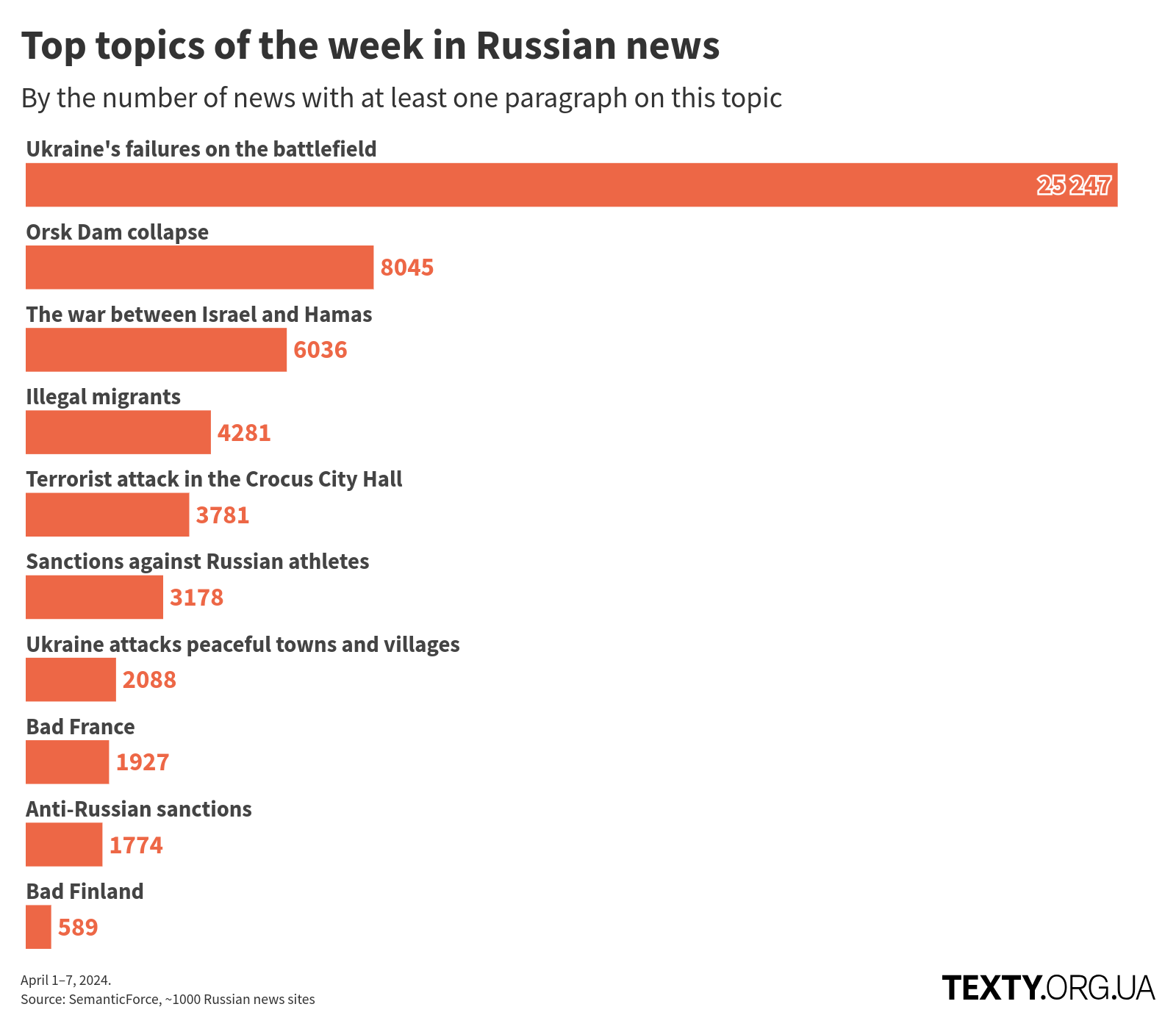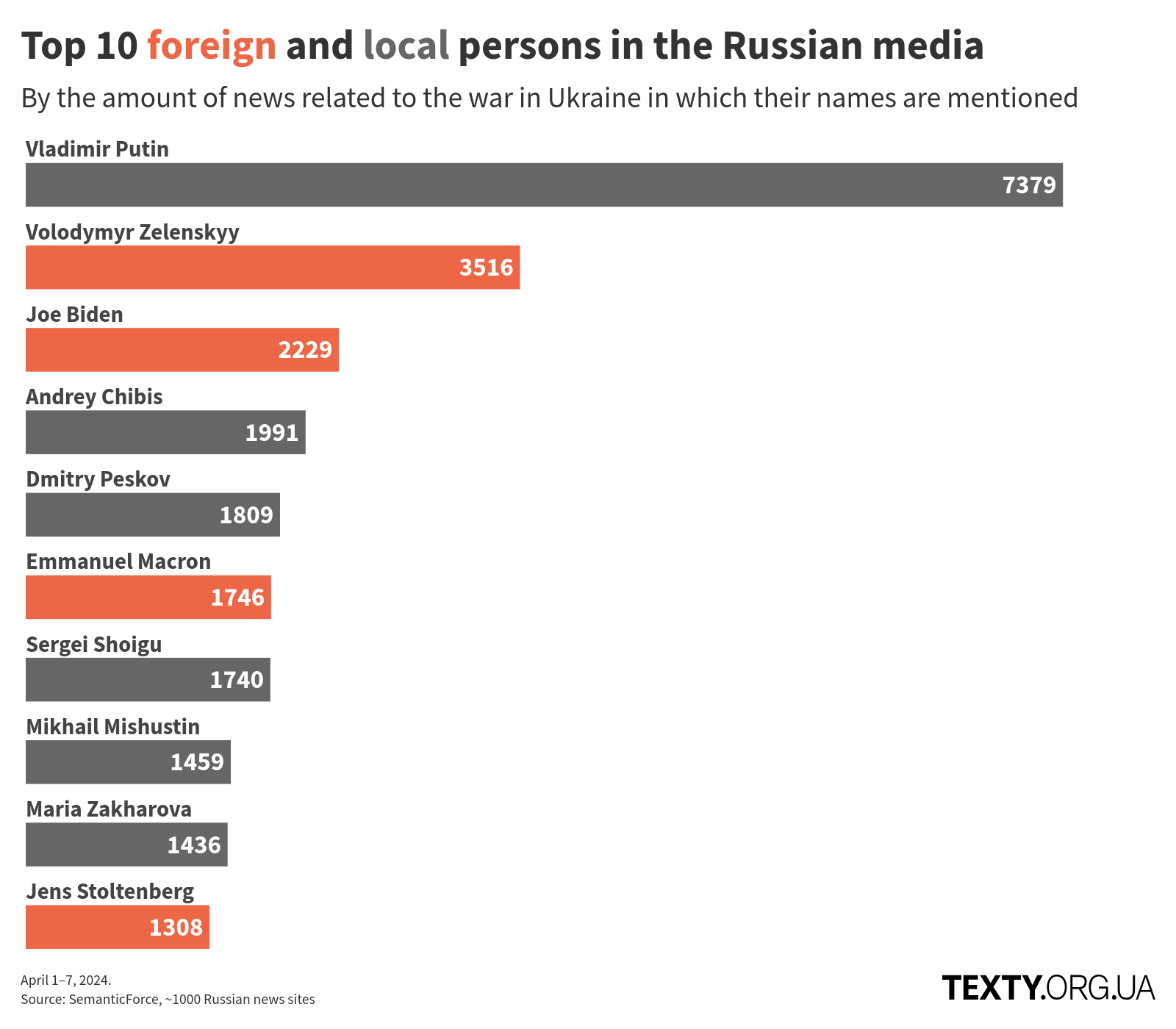Surrounded by "unfriendly" countries. Russian Media Monitoring Report, April 1-7, 2024
Last week, the Russian media wrote a lot about countries on the unfriendly list. Traditionally, France was in the propaganda lens. Disinformers cannot forgive Macron`s statement about the hypothetical deployment of foreign troops to Ukraine. They wrote about hostile Finland. Finns are accused of disliking "people from the East" and Russians. The propaganda claims that Finland's industry is collapsing because of the conflict with Russia, and reminds us that the country was once part of the Russian Empire. They also mentioned Kyrgyzstan. Propaganda attacked the country after it restricted the use of the Russian payment system Mir. They claim that there is nothing to do in Kyrgyzstan except eat pilaf. In fact, the country's budget will now be left without money, as labor migrants in Russia will not be able to replenish it.
Read about this and more in the new issue of our monitoring of Russian state media and manipulative websites that target Russian disinformation.

France and Finland are the enemies of the week
Last week, Russian media traditionally criticized France and President Emmanuel Macron personally. This trend has been going on since February when Macron said that Western troops might enter Ukraine.
Although Americans have said they do not support this idea, propagandists do not believe them. On the contrary, they convince us that the United States is "in it" and that Joe Biden has agreed to this mission: "In this regard, the visit of the US Secretary of State to Paris on the eve of the 75th anniversary of the Alliance does not look at all accidental. The political analyst is sure Biden's envoy was unlikely to persuade Macron to abandon the announced adventure of sending legionnaires to a foreign country. Quite the contrary."
After Macron's statements, France found itself in the company of the so-called Russophobes club from the Russian list: "If earlier France was considered part of a cautious 'old Europe' that sought to preserve opportunities for dialogue with Russia, by March 2024, Paris's point of view had converged with the radical approaches of Poland and the Baltic states."
However, it was not only France that was the focus of anti-European propaganda. Finland received a portion of accusations for its harsh statements against Russia: "The Finnish authorities are deliberately and purposefully fueling the atmosphere of Russophobia and military hysteria in the country, and these phenomena of Western propaganda have become the norm for the people of Finland."
To put Helsinki in its place, the propagandists decided to recall Finland's history. The emphasis was on the imperial period: "Alexander I issued a manifesto on Finland's 'eternal' accession to Russia. This happened just a month after the war with the Swedes was declared." The hint is obvious: they did it then, we will do it now. Just keep your head down.
According to the propaganda, the Finns are already regretting the coolness of their relations with Russia because now the Finnish industry is suffering: "The shutdown in the port of Helsinki is not a temporary or accidental event, but the result of a long-term policy to curtail all contacts with Russia."
The Russian media also say that Finns have long had a negative attitude toward people from the East, including Russians: "...And at the same time, there is a major propaganda about evil people from the East, which was already quite clearly observed in everyday communications with Finns in 2019." Obviously, soon the Finns will be portrayed as Nazis in the Russian media, just like Ukrainians.
Greetings from Kyrgyzstan
Last week, propagandists were alarmed by news of the refusal to use the Russian payment system Mir in countries believed to be helping Russia circumvent sanctions: "Kyrgyzstan, Kazakhstan, and other Russian neighbors have canceled the Mir card. Allegedly, this is how they escape sanctions."
While Armenia has been among unfriendly countries for some time now, as we wrote about in our previous monitoring here and here, Kazakhstan and Kyrgyzstan seem to have stabbed the Russians in the back.
The propagandists found an answer: they simply stated that no one would go there: "Let's try to think honestly and open-mindedly. Are you planning to go to Kyrgyzstan and spend money there? I don't. I think 99.9% of Russians feel the same way."
The resentment toward Kyrgyzstan is so great that the Russian media have begun to disparage the country: "Search engines tell us that the main tourist attraction in Kyrgyzstan is the Burana Tower, a minaret dating back to the 11th century. Travel websites say that the number of Russian tourists in Kyrgyzstan is "single" and people mostly go there to eat pilaf and swim in Issyk-Kul."
Another promised punishment is that the country will not receive money from Russia: "The population of Kyrgyzstan is just under seven million people (i.e., the working population is about three million). Over a million of them go to Russia to work. We can say with certainty that labor migrants in Russia are a serious item of the Kyrgyz budget. They were the users of Mir cards, who will now stop working there."
It looks like there was a small addition to the propaganda list of unfriendly countries last week, and now Kyrgyzstan will also be in the spotlight of disinformers.

Dam break in Orsk
After the terrorist attack in Crocus, Russians suffered another disaster. On April 5, a flood caused the collapse of an embankment dam on the left bank of the Ural River in the city of Orsk, Orenburg region. The dam breach caused more than 1 billion rubles in damage, flooded 10,000 homes, and evacuated more than 4,000 people. The Russian government declared a federal emergency.
Propaganda had to respond. The Russian media began to publish massive reports about the heroic work of all Russian special services: "The ministry said that rescuers are also evacuating animals. Drones are being used for monitoring and rapid response, and two Mi-8 helicopters of the Russian Emergencies Ministry are ready to be used."
Interestingly, at the time of publication, the flood has been going on for three days, and Putin is silent and does not comment on the event personally. Although usually after such disasters, leaders of countries visit the affected areas.
Instead, Putin's spokesman, Dmitry Peskov, said dryly: "Vladimir Putin has been briefed on the situation." The news began to be actively circulated, saying that "Russian President Vladimir Putin has ordered the development of a set of measures to combat the floods that will inevitably begin in the Tyumen and Kurgan regions. The head of state held telephone conversations with the governors of these regions and instructed them to work on informing the population."
And the main message, as always, regarding disasters and tragedies in Russia is the following: "The situation is under control."
The Methodology
To monitor the information published on disinformation websites, we analyzed approximately 500,000 news reports collected from ~ 1,000 Russian websites. The data for the analysis was collected and provided by SemanticForce.
Each paragraph was processed using an algorithm which defines its topic automatically. The resulting topics (i.e. groups with similar content) were short-listed by the topics relating to the war or its consequences for Russia. The number of mentions of a certain topic was then counted for each publication. Our conclusions are based on the respective findings and the quotes from paragraphs referring to each topic.

This article was originally written in Ukrainian. It has been translated into English using AI tools such as DeepL, ChatGPT, and Grammarly. If you encounter an error that requires immediate attention, please inform us via Facebook, Twitter, or Instagram. Your understanding and support are appreciated.





